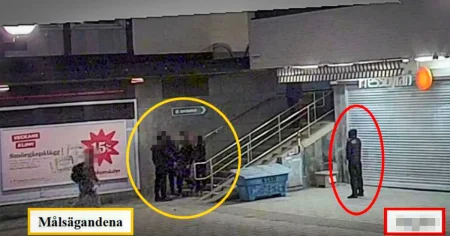The intricate web of deceit woven by a group of young fraudsters was meticulously unravelled by the Swedish investigative journalism program, Uppdrag granskning, in the spring of 2024. The program, armed with data provided by a hacker, exposed the elaborate scheme that systematically defrauded elderly citizens of their savings. The program aired recordings of intercepted phone calls, in which one of the suspects boasted about the scale of their criminal enterprise, claiming they were ”screwing Sweden” and stealing millions. This shocking revelation sparked public outrage and spurred law enforcement to action. The hacker, crucial to uncovering this criminal network, also provided the incriminating evidence to banks and police, ultimately leading to the arrest and subsequent indictment of four individuals involved in the scam.
The four individuals indicted include three young men, aged 19-20, all residing in the Eskilstuna area, and a 29-year-old woman from Gothenburg. They have been charged with aggravated fraud, facing accusations from 80 victims scattered across Sweden. The total sum defrauded amounts to a staggering 12 million kronor. The comprehensive evidence furnished by the hacker has proven invaluable to the prosecution, offering unprecedented insight into the mechanics of the fraud. Prosecutor Anton Larsson Forsberg highlighted the unique nature of the evidence, stating that they possess recordings of the actual fraudulent calls, providing a clear picture of how the scams unfolded and what the perpetrators saw on their screens during the calls. This digital trail left by the criminals offers irrefutable proof of their malicious activities.
Beyond the financial deception, the hacker’s data also revealed a darker side to the group’s activities. The young men were implicated in drug dealing, assault, and extortion, painting a grim picture of their criminal propensities. This discovery broadened the scope of the investigation, highlighting the interconnectedness of different criminal activities. The case underscores the growing concern surrounding organized crime and its increasingly sophisticated methods of exploiting vulnerable individuals.
The case highlights a concerning trend: the rise of fraud as a significant revenue stream for organized crime. Law enforcement agencies have observed a steady increase in fraud-related activities over the past several years, with telephone scams targeting the elderly becoming particularly prevalent. This vulnerability of older citizens to sophisticated manipulation tactics underscores the need for increased awareness and preventative measures. The perpetrators exploit the trust and often times technological unfamiliarity of older individuals, making them easy targets for these heartless schemes.
In 2023, Swedish police estimated the profits from fraud-related crimes to be a staggering 7.5 billion kronor. However, organizations like Europol and the Confederation of Swedish Enterprise believe that this figure represents only a fraction of the actual criminal proceeds, suggesting the true figure could be almost three times higher. This discrepancy highlights the immense challenge faced by law enforcement in accurately assessing the full economic impact of fraud. The hidden nature of these crimes, coupled with the difficulty in tracking and recovering stolen funds, contributes to the significant underestimation of the problem.
The upcoming trial, scheduled to commence on January 20th, is expected to shed further light on the intricacies of this complex fraud operation. The case has garnered significant public attention, not only due to the substantial financial losses suffered by the victims but also because it exposes the vulnerability of a particularly susceptible segment of the population. The trial will serve as a crucial test case for the effectiveness of utilizing hacker-provided evidence in prosecuting complex fraud cases. The outcome will likely have implications for future investigations and could shape legal strategies for combating the ever-evolving landscape of cybercrime. It is hoped that the trial will bring justice to the victims and deter similar criminal activities in the future.













